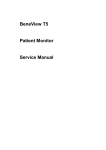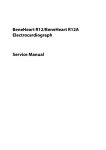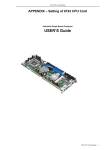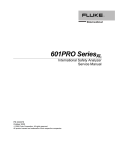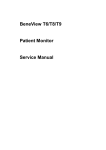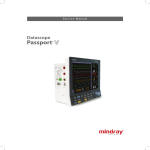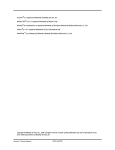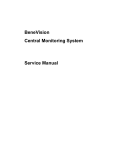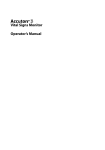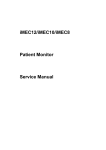Download BeneHeart R3/BeneHeart R3A Electrocardiograph Service Manual
Transcript
BeneHeart R3/BeneHeart R3A Electrocardiograph Service Manual Intellectual Property Statement SHENZHEN MINDRAY BIO-MEDICAL ELECTRONICS CO., LTD. (hereinafter called Mindray) owns the intellectual property rights to this product and this manual. This manual may refer to information protected by copyrights or patents and does not convey any license under the patent rights of Mindray, nor the rights of others. Mindray does not assume any liability arising out of any infringements of patents or other rights of third parties. , , and are the registered trademarks or trademarks owned by Mindray in China and other countries. Revision History This manual has a revision number. This revision number changes whenever the manual is updated due to software or technical specification change. Contents of this manual are subject to change without prior notice. Version number 1.0 Release time: April 2013 © 2013 Shenzhen Mindray Bio-Medical Electronics Co., Ltd. All rights reserved. I Preface Manual Purpose This manual provides detailed information about the assembling, dissembling, testing and troubleshooting of the equipment to support effective troubleshooting and repair. It is not intended to be a comprehensive, in-depth explanation of the product architecture or technical implementation. Observance of the manual is a prerequisite for proper equipment maintenance and prevents equipment damage and personnel injury. Intended Audience This manual is for biomedical engineers, authorized technicians or service representatives responsible for troubleshooting, repairing and maintaining the equipments Passwords A password may be required to access different modes. The passwords are listed below: Maintain Mode: 888888 Demo Mode: 2088 II Contents 1 General.............................................................................................................................. 1-1 1.1 Revision History ............................................................................................................. 1-1 1.2 Safety Information .......................................................................................................... 1-1 1.2.1 DANGER ........................................................................................................... 1-2 1.2.2 Warnings............................................................................................................. 1-2 1.2.3 Cautions ............................................................................................................. 1-2 1.2.4 Notes .................................................................................................................. 1-3 1.3 Equipment Symbols ........................................................................................................ 1-3 2 Theory of Operation ........................................................................................................ 2-1 2.1 Introduction..................................................................................................................... 2-1 2.2 Connectors for External Equipment................................................................................ 2-2 2.3 Main Unit ........................................................................................................................ 2-4 2.4 Top housing assembly ..................................................................................................... 2-5 2.4.1 Main Control Board ........................................................................................... 2-5 2.4.2 Keypad Board..................................................................................................... 2-6 2.4.3 AC/DC Power Board.......................................................................................... 2-6 2.4.4 Recorder Drive Board ........................................................................................ 2-6 2.4.5 Parameter Board................................................................................................. 2-6 3 Unpacking and Installation ............................................................................................. 3-1 3.1 Unpacking the Equipment............................................................................................... 3-1 3.2 Preparation for Installation.............................................................................................. 3-1 3.3 Turning On the Equipment.............................................................................................. 3-2 4 Hardware and Software Upgrade................................................................................... 4-1 4.1 Hardware Upgrade .......................................................................................................... 4-1 4.2 Software Upgrade............................................................................................................ 4-1 4.2.1 Installing Software Upgrade Tool ...................................................................... 4-2 4.2.2 Software Upgrade Procedure ............................................................................. 4-4 5 Testing and Maintenance................................................................................................. 5-1 5.1 Introduction..................................................................................................................... 5-1 5.1.1 Test Equipment................................................................................................... 5-1 5.1.2 Test Report ......................................................................................................... 5-1 5.1.3 Preventative Maintenance .................................................................................. 5-1 5.1.4 Recommended Frequency .................................................................................. 5-2 5.2 Visual Inspection ............................................................................................................. 5-2 5.3 Power-on Test.................................................................................................................. 5-3 1 5.4 ECG Performance Test.................................................................................................... 5-3 5.5 Recorder check................................................................................................................ 5-3 5.6 Battery Check.................................................................................................................. 5-4 5.7 Maintenance Mode.......................................................................................................... 5-4 6 Troubleshooting................................................................................................................ 6-1 6.1 Overview......................................................................................................................... 6-1 6.2 Parts Replacement........................................................................................................... 6-1 6.3 Quickly Identifying Failure............................................................................................. 6-1 6.4 General Problems ............................................................................................................ 6-2 6.5 Messages ......................................................................................................................... 6-3 6.5.1 Message List 1.................................................................................................... 6-4 6.5.2 Prompt Message List 2....................................................................................... 6-6 6.6 Troubleshooting Guide.................................................................................................... 6-8 6.6.1 Power On/Off Failure......................................................................................... 6-8 6.6.2 Recorder Failures ............................................................................................... 6-9 6.6.3 Wrong system time........................................................................................... 6-10 7 Disassembly and Repair .................................................................................................. 7-1 7.1 Tools Required ................................................................................................................ 7-1 7.2 Preparations for Disassembly.......................................................................................... 7-1 7.3 Disassembling the Main Unit.......................................................................................... 7-2 7.3.1 Removing Bottom housing assembly................................................................. 7-2 7.3.2 Remove the Power Board................................................................................... 7-3 7.3.3 Removing the Main Control Board .................................................................... 7-3 7.3.4 Removing the Display........................................................................................ 7-4 7.3.5 Removing the Parameter Board ......................................................................... 7-5 7.3.6 Removing the Keypad Board ............................................................................. 7-5 7.3.7 Removing the Recorder Drive Board................................................................. 7-6 7.3.8 Removing the Thermal Print Head..................................................................... 7-7 8 Parts .................................................................................................................................. 8-1 8.1 Introduction..................................................................................................................... 8-1 8.2 Main Unit ........................................................................................................................ 8-2 8.2.1 Exploded View ................................................................................................... 8-2 8.2.2 Parts List ............................................................................................................ 8-3 8.3 Top Housing Assembly (115-017634-00 or 115-017793-00).......................................... 8-5 8.3.1 Exploded View ................................................................................................... 8-5 8.3.2 Parts List ............................................................................................................ 8-5 8.4 Recorder door assembly (115-017633-00)...................................................................... 8-6 8.4.1 Exploded View ................................................................................................... 8-6 8.4.2 Parts List ............................................................................................................ 8-6 8.5 Bottom housing assembly (115-017792-00 or 115-018387-00)...................................... 8-7 8.5.1 Exploded View ................................................................................................... 8-7 2 8.5.2 Parts List ............................................................................................................ 8-7 9 BeneHeart R3/R3A Replacement Partes........................................................................ 9-1 9.1 BeneHeart R3/R3A BOM (V1.0) for Repair, Upgrade and Accessories......................... 9-1 9.2 Material Change.............................................................................................................. 9-4 A Electrical Safety Inspection ........................................................................................... A-1 A.1 Power Cord Plug ........................................................................................................... A-1 A.2 Device Enclosure and Accessories ................................................................................ A-2 A.3 Device Labeling ............................................................................................................ A-2 A.4 Protective Earth Resistance........................................................................................... A-2 A.5 Earth Leakage Test ........................................................................................................ A-4 A.6 Patient Leakage Current ................................................................................................ A-6 A.7 Mains on Applied Part Leakage .................................................................................... A-7 A.8 Patient Auxiliary Current .............................................................................................. A-9 A.9 Scheduled Electrical Safety Inspection ........................................................................A-11 A.10 Electrical Safety Inspection after Repair................................................................... A-12 3 FOR YOUR NOTES 4 1 General 1.1 Revision History Manual Version Description of Changes 1.0 First release Change Time SN Since 1.2 Safety Information DANGER z Indicates an imminent hazard that, if not avoided, will result in death or serious injury. WARNING z Indicates a potential hazard or unsafe practice that, if not avoided, could result in death or serious injury. CAUTION z Indicates a potential hazard or unsafe practice that, if not avoided, could result in minor personal injury or product/property damage. NOTE z Provides application tips or other useful information to ensure that you get the most from your product. 1-1 1.2.1 DANGER There are no dangers that refer to the product in general. Specific “Danger” statements may be given in the respective sections of this manual. 1.2.2 Warnings WARNING z All installation operations, expansions, changes, modifications and repairs of this product are conducted by authorized personnel. z Disconnect the equipment from external power source and remove the battery before disassembling the equipment. z When you disassemble/reassemble the equipment, a patient leakage current test must be performed before it is put in use. z The equipment must be connected to a properly installed power outlet with protective earth contacts only. If the installation does not provide for a protective earth conductor, disconnect it from the power line and operate it on battery power, if possible. z Dispose of the package material, observing the applicable waste control regulations and keeping it out of children’s reach. 1.2.3 Cautions CAUTION z Make sure that no electromagnetic radiation interferes with the performance of the equipment when preparing to carry out performance tests. Mobile phone, X-ray equipment or MRI devices are a possible source of interference as they may emit higher levels of electromagnetic radiation. z Before connecting the equipment to the power line, check that the voltage and frequency ratings of the power line are the same as those indicated on the equipment’s label or in this manual. z Protect the equipment from damage caused by drop, impact, strong vibration or other mechanical force during servicing. 1-2 1.2.4 Notes NOTE z Refer to Operation Manual for detailed operation and other information. 1.3 Equipment Symbols Caution (Attention, consult accompanying documents) ON/OFF for equipment Battery indicator Alternating current (AC) DEFIBRILLATION-PROOF TYPE CF APPLIED PART Equipotentiality Network connector USB connector DATE MANUAFACTURE OF part of Serial number Dispose of in accordance to your country’s requirements General symbol recovery/recyclable for CCC Mark – China Compulsory Certification mark China Certification Environment-friendly Used Period per Chinese Standard SJ/T11363-2006 Authorized representative in the European Community Metrology The product bears CE mark indicating its conformity with the provisions of the Council Directive 93/42/EEC concerning medical devices and fulfils the essential requirements of Annex I of this directive. NOTE z Some symbols may not appear on your equipment. 1-3 FOR YOUR NOTES 1-4 2 Theory of Operation 2.1 Introduction BeneHeart R3/BeneHeart R3A Electrocardiograph (hereafter referred to as “the equipment” or “the system”) is intended to acquire, analyze, display, store, and record the patient’s electrocardiographic information for clinical diagnosis and study. The equipment provides the following functions: Display 12-lead ECG waveforms in real time; print manual, auto, and rhythm measurements. Perform resting ECG interpretation, output measurements and diagnosis in auto measurement mode. Save ECG data in internal memory and export the data through a USB memory. Enables program upgrade over the network. Internet Mobile Viewer PC / ECG Management -in ilt Bu ECG Server W i i-F Bu iltin Wi -Fi USB 2-1 L A N The above figure shows the system consists of the electrocardiograph and its peripheral devices. The electrocardiograph: Acquires, processes and reviews 12-lead resting ECG data; Prints ECG reports; Runs on AC power source or a battery. Exports data through a USB memory. 2.2 Connectors for External Equipment The connectors for external devices are located on the left and rear of the equipment. Side View 2 1 1. Patient cable connector: connects the patient cable for ECG acquisition 2. Recorder door latch: opens the recorder door 1 2 2 1. Network connector: connects the equipment to the network for software upgrade 2. USB connector: connects USB disc for data transfer 2-2 Back View 1 1. 2 AC power input 2. Equipotential Grounding Terminal: When the equipment and other devices are to be used together, their equipotential grounding terminals should be connected together to eliminate the potential difference between them. Bottom View 1 1. Battery compartment 2-3 2.3 Main Unit The equipment consists of the following parts: Top housing assembly: consists of main control board, keyboard assembly, display, power switch, power board (AC/DC), recorder, and parameter board. Lower housing: includes a battery compartment. The following figure shows the main unit architecture: Thermal head module W7 Power board W1 USB RJ45 Recorder drive board Keypad board W3 W2 Main control board W5 W6 Battery LCD W4 Wi-Fi (reserved) 2-4 Parameter Board 2.4 Top housing assembly Power board Recorder drive board Bosses for screwing top and bottom housings together Bosses for screwing top and bottom housings together Keypad board Parameter board 2.4.1 Main Control Board The main control board provides the following functions: Drive display and control back light Store data Process printing Implement serial port communication Drive buzzer Provide USB and wired network connection Process data Implement power supply conversion Charge the battery Implement power management 2-5 Main control board 2.4.2 Keypad Board The keypad board drives the keys. The power on/off switch, AC indicator and battery indicator are also located on the keypad board. 2.4.3 AC/DC Power Board The power board transforms AC power to DC power. 2.4.4 Recorder Drive Board The recorder drive board drives the recorder module. 2.4.5 Parameter Board Parameter board is responsible for ECG data acquisition. 2-6 3 Unpacking and Installation 3.1 Unpacking the Equipment Open the package and take out the packing list. Check that all the articles included in the packing list are available and the quantity and specification are correct. All the optional parts purchased by the customer shall also be checked. Notify the supplier if provided components are not correct as compared to the packing list. In case of damage during transportation, keep the packing material and notify the supplier immediately. Keep the packing material till the equipment is accepted. 3.2 Preparation for Installation 1. Ensure that the site meets all safety, environmental and power requirements 2. Check that required power sockets are available. 3. Check that a network connector is available if the equipment needs to be connected to the wired network. Environmental Requirements To avoid explosion hazard, do not use the equipment in the presence of flammable anaesthetics, vapours or liquids. The environment where the equipment will be used should be reasonably free from vibration, dust and corrosive substances. If these conditions are not met, the accuracy of the system may be affected and damage may occur. Enviornment Check and make sure that there is no electromagnetic interference source around the equipment, especially large medical electrical equipment such as radiological equipment and magnetic resonance imaging equipment etc. Switch off these devices when necessary. Keep the examination room warm (no less than 18℃) to avoid muscle action voltages in ECG signal caused by cold. 3-1 Power supply Check that power supply specification is met and the power cord is securely connected if mains power is used. Use only power socket that is properly grounded. AC mains Input voltage 100-240V~ (±10%) Input power 60 VA Frequency 50 Hz/60 Hz (±3 Hz) Battery Battery Type When powered by a new fully-charged battery and at ambient temperature 25 ℃±5 ℃, ≥500 auto measurement reports, or 2 hours of continuous recording, or 6 hours of measurement without recording With equipment power off and at ambient temperature 25 ℃±5 ℃, ≤3 h to 90% capacity Run time ≤3.5 h to 100% capacity Shutdown delay at least 5 minutes (after a low battery message first occurs) 3.3 Turning On the Equipment Once the equipment has been installed and checked, you can get ready for measurement and recording: 1. Connect the equipment with AC mains. If you run the equipment on battery power, ensure that the battery is sufficiently charged. 2. Press the power on/off switch. 3-2 4 Hardware and Software Upgrade 4.1 Hardware Upgrade Not applicable. 4.2 Software Upgrade You can upgrade the system by installing and running the Mindray Patient Monitor Software Upgrade Tool (PN: 110-000493-00) on a PC with Windows operating system. Connect the equipment to be upgraded and the PC running the upgrade tool to the same network, or directly connect the equipment and the PC via a crossover network cable. Then configure the IP address of the PC. You can upgrade the following software: No. 1 Software type System softwar package 2 3 Module software 4 5 6 7 Software function upgrade package PN Description 110-002535-00 System software Chinese) / System software package (Traditional Chinese) 110-002525-0 Power management program 110-002545-00 M501 ECG module STM32 chip writing software 110-001201-00 TR8A recorder drive chip writing software 115-017992-00 Glasgow upgrade pack (FRU, Chinese) 115-018007-00 Glasgow upgrade pack (FRU, English) 115-017996-00 PDF format upgrade pack (FRU) package (Simplified Note: No specific sequence is required for the upgrading of above software. For detailed information, please refer to 4.2.2 Software Upgrade Procedure. 4-1 4.2.1 Installing Software Upgrade Tool 1. Find the installation program installation. , and double click it to start 2. Select language. 3. Click [Ok] and the following screen is displayed. Click [Next] to go to the next step. 4. Enter User Name, Company name, and Serial Number "26582640". Then click [Next]. 4-2 5. Specify the destination folder for installing this program. Then select [Next]. 6. Select Program Folder. Then select [Next]. 7. Click [Finish] to complete installation. 4-3 4.2.2 Software Upgrade Procedure 1. Connect the equipment to be upgraded and the PC running the upgrade tool to the same network, or directly connect the equipment and the PC via a crossover network cable. 2. Set the IP address of the PC to "77.77.1.XX" and subnet mask to "255.255.255.0". 3. Run Mindray Patient Monitor Software Upgrade Tool on the PC and set Machine to [BeneHeart R3/R3A]. 4. On the Mindray Patient Monitor Software Upgrade Tool screen, select [Select Package] and then the packages you want to upgrade. Then select [Start]. 5. Turn on the equipment to be upgraded. Press and hold "F1" key and "F4" key for 2 to 3 seconds. Then the equipment enters upgrade mode and starts software upgrade automatically. Corresponding prompt messages are displayed to be upgraded on both the equipment and PC. When software upgrade is finished, restart the equipment and check if the software is correctly upgraded. For details of software upgrade, please refer to help and instructions for use of Mindray Patient Monitor Software Upgrade Tool. CAUTION z Disconnect the equipment from the patient and make sure the important data are saved before upgrade. z Do not shut down or power off the equipment when upgrading the system software. Otherwise, it may cause the equipment to break down. z Software upgrade should be performed by qualified service personnel only. z Crossover network cable is recommended when a PC is connected for software upgrade. NOTE z Make sure the version of the upgrade package is what you desired. To obtain the latest upgrade package, please contact Mindray Customer Service Department. 4-4 5 Testing and Maintenance 5.1 Introduction To ensure the equipment always functions normally, qualified service personnel should perform regular inspection, maintenance and test. This chapter provides a checklist of the testing procedures for the equipment with recommended test equipments and frequency. The service personnel should perform the testing and maintenance procedures as required and use appropriate test equipments. The testing procedures provided in this chapter are intended to verify that the equipment meets the performance specifications. If the equipment or a module fails to perform as specified in any test, repairs or replacements must be done to correct the problem. If you have any question, contact our Customer Service Department. CAUTION z z All tests should be performed by qualified service personnel only. Service personnel should acquaint themselves with the test tools and make sure that test tools and cables are applicable. 5.1.1 Test Equipment See the following sections. 5.1.2 Test Report Upon the completion of the tests, the table of preventative maintenance test reports and the table of maintenance test reports in this chapter should be kept properly. 5.1.3 Preventative Maintenance Below are preventative maintenance tests which need to be performed on the equipment. See the following sections for detailed maintenance procedures. 5-1 5.1.4 Recommended Frequency Check/Maintenance Item Frequency Visual inspection 1. When first installed or reinstalled. 1. When first installed or reinstalled. 2. Following any repairs or replacement of any main unit parts. Power-on test Performance Test ECG test Electric tests Module Calibration safety Refer to A Electrical Safety Inspection 1. If the user suspects that the measurement is incorrect. 2. Following any repairs or replacement of relevant module. 3. At least once every two years. 1. Following any repair or replacement 2. After the equipment drops. 3. At least once every two years. Following any repair or replacement of the recorder. Recorder check Functional test Battery check Performance test 1. When first installed. 2. Whenever a battery is replaced. Once per year, or if the battery run time reduced significantly. 5.2 Visual Inspection Inspect the equipment for obvious signs of damage. The test is passed if the equipment has no obvious signs of damage. Follow these guidelines when inspecting the equipment: Carefully inspect the case, display screen, keys, and knob for obvious signs of damage. Inspect the power cord, wall mount, and accessories for obvious signs of damage. Inspect all external connections for loose connectors, bent pins or frayed cables. Inspect all connectors on the equipment for loose connectors or bent pins. Make sure that safety labels and data plates on the equipment are clearly legible. 5-2 5.3 Power-on Test This test is to verify that the equipment can power up correctly. The test is passed if the equipment starts up by following this procedure: 1. Install the battery, and connect the equipment to AC power. The AC mains indicator and battery indicator are illuminated. 2. Press the Power On/Off switch to turn on the equipment. Then the equipment performs self-test as soon as the equipment is powered on. 5.4 ECG Performance Test Tool required: Patient simulator, eg. Medsim300B or equivalent equipment Test Method: 1. Connect the patient cable to the equipment under test and the lead wires to the patient simulator. 2. Set the patient simulator as follows: ECG sinus rhythm, HR = 80 bpm, with the amplitude as 1 mV (default setting). 3. Check that the displayed ECG waveforms are clear and complete without obvious noise. 4. Press the [ECG] key to start automatic ECG measurement. Print out the waveforms and diagnosis. 5. Check that the displayed ECG waveforms are clear and complete with the amplitude of lead II waveform about 10 mm (assumed the Gain is set to 10mm/mV), and diagnosis indicating sinus rhythm and HR 80 bpm. 6. Disconnect each of the leads in turn and observe the corresponding lead off message displayed on the screen. 5.5 Recorder check Tool required: None 1. Print ECG waveforms. The recorder should print correctly and the printout should be clear. 2. Simulate some recorder problems, such as out of paper, paper jam, and etc., and then the equipment should present the message "Check Recorder". After the problem is removed, the recorder should be able to work correctly. 5-3 5.6 Battery Check Tool required: None Functional Test 1. If the equipment is installed with a battery, remove the battery first. 2. Verify that the equipment works correctly when running powered form an AC source. 3. Verify that battery is installed. If not, install the battery. 4. Remove the AC power cord and verify that the equipment still works correctly. Performance Test Perform the test by referring to the chapter 9 Battery in the Operator’s Manual and verify the operating time of the battery meets the product specification. 5.7 Maintenance Mode The equipment includes maintenance mode for you to check the equipment conveniently. To enter the maintenance mode, select [Menu]→[System Setup]→[Maintain Mode]→enter required password. The password for the maintenance mode is 332888 when the equipment left the factory. You cannot change this password. If you have problem to enter the maintenance mode, please contact your service personnel. You can perform the following tests in the maintenance mode: Display test Sound test Keypad test Lead wire check Recorder test Internal communication test USB test Internal storage Test Select a test item you want to perform, and follow the on-screen prompt. 5-4 In the maintenance mode, you can also View device information Check work log Set the frequency of AC filter Format the internal memory Input the equipment's serial number Import hospital and department name To exit the maintenance mode, turn off the equipment. Maintenance and Test Report (See the above sections for detailed test procedures and contents) Customer name Customer address Servicing person Servicing company Equipment under test (EUT) Model of EUT SN of EUT Hardware version Software version Test equipment Model/No. Expiration Date for Calibration 5-5 Test Contents Test Record Visual Inspection The housing, display screen, keys, power cord, and accessories have no obvious signs of damage. The external connecting cables are not frayed and the connector pins are not loose and bent. The external connectors are not loose or their pins are not bent. The safety labels and data plate are clearly legible. Power-on Test The power-on self test is passed. The power indicator works correctly and the equipment starts up properly. Performance test ECG performance test and calibration The ECG waveforms displayed and printed out should be clear and complete without obvious noise. The amplitude of lead II waveform is about 10 mm and diagnosis indicate sinus rhythm and HR 80 bpm. ECG Lead Off prompt behaves correctly. Recorder check The recorder can print ECG waves correctly and the printout is clear. Simulate recorder problems, such as out of pater and paper jam, the message "Check Recorder" shall be presented. Battery Check The equipment can operates correctly from battery power when an AC power failure accidentally occurs. The equipment can operate independently on a single battery. Test conclusion: Tested by: Test date: 5-6 Test Result (Pass/Fail) 6 Troubleshooting 6.1 Overview In this chapter, equipment problems are listed along with possible causes and recommended corrective actions. Refer to the tables to check the equipment, identify and eliminate the troubles. The troubles we list here are frequently arisen difficulties and the actions we recommend can correct most problems, but not all of them. For more information on troubleshooting, contact our Customer Service Department. 6.2 Parts Replacement The equipment's PCBs, major parts and components are replaceable. Once you isolate a PCB you suspect defective, follow the instructions in Chapter 7 Disassembly and Repairto replace the PCB with a known good one and check that the trouble disappears or the equipment passes all performance tests. Defective PCB can be sent to us for repair. If the trouble remains, exchange the replacement PCB with the original suspicious PCB and continue troubleshooting as directed in this chapter. To obtain information on replacement parts or order them, refer to 9 BeneHeart R3/R3A Replacement Partes. 6.3 Quickly Identifying Failure Some troubleshooting tasks may require you to identify the hardware version and status of your equipment. To check equipment information, Select [Menu]→[System Setup]→[Maintain Mode]→Enter the required password to enter the maintenance mode. In the maintenance mode, you can perform related tests to primarily identify the failure. 6-1 6.4 General Problems This chapter lists the problems that are likely to occur. If the problem persists after corrective actions have been taken, please contact your service personnel. Symptom Possible Cause Corrective actions The equipment does not power up. 1. The equipment is not connected to AC mains. 1. Check that the power cord is securely connected. 2. Battery is not installed or has no charge. 2. Check that the battery is installed and has sufficient charge. Otherwise, connect the equipment to AC mains to run the equipment and charge the battery. 1. Patient movement. 1. Tell the patient not to move during ECG acquisition. ECG data displays unacceptable noise. 2. Improper filter setting. 3. Poor skin preparation. 4. Electrode problem. 5. Patient cable problem. 6. Wrong accessories are used or mix electrode types and brands. 2. Check the settings of the filters are appropriate. 3. Prepare the patient before ECG acquisition. 4. Verify the electrodes are applied correctly. Check for defective or expired electrodes. 5. Check for defective, broken or disconnected patient cable. 6. Use specified accessories. Do not mix electrode types or brands. The recorder does not work. 1. Paperless recording is enabled. 2. Recording paper is not loaded. 1. Select [Menu]→[Record Setup] and set [Paperless Recording] to [Off]. 3. Recorder door is not properly closed. 2. Verify recording paper is properly loaded. 4. Print head is too hot. 4. Wait till the print head cools down. 5. Recorder is disabled due to depleted battery. 5. Connect the equipment to AC mains to run the equipment and charge the battery. Paper jammed or misaligned. 1. Unapproved paper is used. 1. Use approved recording paper. 2. Recording paper is not properly loaded. 2. Take out the paper and tear off the jammed part. Reload the paper as described in 3.2.3 Loading Paper of the Operator’s Manual. Partially missing printout or printout not clear. 1. Dirty print head. 1. Clean the print head. 2. Some thermal points on print head are damaged. 2. If the problem persists, contact your service personnel. 6-2 3. Verify recorder door is properly closed. Symptom Possible Cause Corrective actions The equipment automatically shuts down. 1. Auto shutdown is enabled. 1. Check the setting of [Auto Shut Down] by selecting [Menu]→[System Setup]. In the case that any of limb leads is off, the equipment automatically shut down if there is no operation when the defined time is reached. 2. The battery is depleted when the equipment runs on battery power. 2. Connect the equipment to AC mains to run the equipment and charge the battery. The display is completely blank. Auto Standby is enabled. In the case that any of limb leads is off, the equipment automatically turns off the display to save power if there is no operation when the defined time is reached. To exit the standby mode, press any key. The screen display is too dark to be seen clearly. The setting of brightness is low. Adjust screen brightness. 6.5 Messages The equipment prompts messages to indicate the current system status. Some messages, see Message List 1, are more important and urgent, and need you to acknowledge or take actions in time. The system pops up a dialog box when these messages happen. In this case, you cannot operate the equipment unless you press any key to clear the messages or wait till the triggers disappear. Some messages, see Message List 2, are less important. These messages are shown in the message area. They disappear automatically when the triggers disappear. The equipment can give a notification tone when a message is presented. The notification tone is switched off by default. You can enable it by accessing the [System Setup] menu.. However, the equipment always gives a notification tone when some messages occur regardless of the setting of [Notification tone]. Refer to the messages followed by an asterisk in the Messages Lists below. 6-3 6.5.1 Message List 1 Message Trigger Action Battery depleted!* The battery is too low. Connect the equipment to AC mains to run the equipment and charge the battery. Recorder unavailable!* 1. When recording is needed or a measurement is started. In this case a dialog box pops up. You can press any key to close the dialog box. It does not affect the function. 1. Verify that recording paper is properly loaded. 2. Recorder communication error or does not work. 2. Verify the platen of the print head is in position. 3. Verify that the recorder does not stop due to hot print head. 4. If the message persists after above actions have taken, contact your service personnel. ECG module error* Damaged ECG board or software failure causes ECG communication error or communication stops. Contact your service personnel. Paper type error * The setting of [Paper Type] is different with the used paper type. Verify the setting of [Paper Type] is correct by selecting [Menu]→ [System Setup]. Configuration loaded successfully* The configuration is successfully loaded. / Configuration restored successfully * Default configuration is successfully restored. / Loading configuration failed* Main control software or hardware fails. Contact your service personnel. USB memory not found The system fails to find the USB memory. 1. Verify the USB memory is properly plugged. 2. If the message persists, format the USB memory and try again. Configuration file not found* Exporting data. Please wait... (X/Y) Configuration file is not found in the USB memory when [Load Configuration] is selected. 1. Verify that correct configuration file is stored in the USB memory. The system is exporting patient data. / X refers to the number of files having been exported, while Y refers the total number of files to be exported. 6-4 2. Check whether the file system is damaged. If yes, contact your service personnel. Message Trigger Action Failed to create file(s) The system failed to create files when file(s) are being exported. Check whether the USB memory is properly plugged. If yes, the file system might be damaged. Format the USB memory and try again. Data export completed Patient data is successfully exported. / Export configuration successfully Configuration is successfully exported. / Export failed Exporting patient data failed. 1. Check that the settings are correct and a correct option is select. 2. Check that USB memory is properly inserted and file system is not damaged. 3. Check that the USB memory has sufficient space. Deleting... File(s) are being deleted. / Deleted successfully A single file or all files are successfully deleted. / Deleting failed Deleting file(s) failed. Check that deleting option is selected. You can format the internal memory if you want to delete all the files. USB memory low The USB memory has insufficient space when patient data or configuration is to be exported to the USB memory. Delete useless files stored in the USB memory to release the memory space. Formatting failed Formatting memory failed. Internal memory might be damaged. Contact your service personnel. Formatting completed The memory is successfully formatted. / Formatting. Please wait... The memory is being formatted. / Shutting down... The system is shutting down. / Note: * means that the equipment always gives a notification tone when the message occurs. 6-5 6.5.2 Prompt Message List 2 Message Trigger Action Data memory unavailable* Data memory is unavailable or cannot detect the data memory. Contact your service personnel. Data memory error* Unable to read or write the data memory. Contact your service personnel. RT clock need reset* The real-time clock displays the initial value because button cell failed and reset, or button cell is not available. Contact your service personnel. RT clock error* Unable to read the real-time clock register. Contact your service personnel. Battery error * Failure is detected when the battery is being charged. Contact your service personnel. Device abnormal voltage * The voltage of PCBA power supply is abnormal. Contact your service personnel. Limb lead off 1. RL lead off or more than one limb lead off. 1. Check corresponding electrodes and lead wires. Re-apply the electrodes or reconnect the lead wires if necessary. 2. Patient cable is detached from the equipment. 2. Check that patient cable is properly connected to the equipment. XX Lead off The referred lead is off. Check corresponding electrodes and lead wires. Re-apply the electrodes or reconnect the lead wires if necessary. Noise Noise or artifacts from lead I, II, V1, V2, V3, V4, V5, V6 is detected. Check the patient. Recording... The recorder is working. To stop printing, press the [ECG] key (for auto measurement recording), or [Manual] key (for manual measurement recording) or the [Rhythm] key (for rhythm measurement recording). Analyzing... The algorithm is analyzing acquired ECG data. / Analyzing Failed The algorithm fails to analyze acquired ECG data and is unable to give disagnoses. Refer to“12-Lead ECG Interpretive Program Physician’s Guide” (PN: 046-004817-00). (XX refers to LA/F, LL/L, V1/C1-V6/C6) 6-6 Message Trigger Action ECG data insufficient In the situation that pre-acquisition is enabled, the equipment has not acquired 10 seconds of ECG data when auto measurement is started. Wait till sufficient data is acquired. Acquiring... The equipment is acquiring 60-second ECG data when rhythm measurement is started. Wait till 60 seconds of countdown is reached. To stop acquisition, press the [Rhythm] key. Please check recorder 1. Recording paper is not loaded or runs out. 1. Verify that recording paper is loaded and sufficient. 2. Recorder door is not properly closed. 2. Verify recorder door is properly closed. Recorder head hot * Print head has heated up do to heavy use. Stop printing and wait till the message disappears. IP address conflict IP address conflict. Contact your service personnel. The memory space insufficient Left memory space is less than 10 files. Delete useless historic files. Low battery Battery charge is low. Connect the equipment to AC mains to run the equipment and charge the battery. Note: * means that the equipment always gives a notification tone when the message occurs. 6-7 6.6 Troubleshooting Guide 6.6.1 Power On/Off Failure 6-8 6.6.2 Recorder Failures Recorder not work Message “Recorder unavailable!” presented? Y Y Ok after recorder drive board replaced? Message “Please check recorder” presented? N N Message “Please check recorder” presented? Replace main board N Y End Replace print head Recorder runs by pressing “Manual” key? Y Recording paper incorrectly loaded N Reconnect or replace cable Y N N 1. Check platen in position. 2. Check paper correctly loaded. 3. Close battery door. Cable between recorder and main board loose or failed? Message “Paper type error” presented? Y Set “Paper Type”correctly 6-9 N Perform keypad test in maintenance mode. Replace keypad board if failed. Y End 6.6.3 Wrong system time Displayed system time is wrong Message “RT clock error” is presented? Y Replace main control board N Reset system time Y OK N No cell button or cell button failed Y N Replace main control board 6-10 Replace button cell 7 Disassembly and Repair 7.1 Tools Required To disassemble and replace the parts and components, the following tools may be required: Philips screwdrivers Tweezers Sharp nose pliers Clamp 7.2 Preparations for Disassembly Before disassembling the equipment, finish the following preparations: Stop measuring, turn off the equipment, and disconnect all the accessories and peripheral devices. Disconnect the AC power source and remove the battery. WARNING z Before disassembling the equipment, be sure to eliminate the static charges first. When disassembling the parts labeled with static-sensitive symbols, make sure you are wearing electrostatic discharge protection such as antistatic wristband or gloves to avoid damaging the equipment. z Properly connect and route the cables and wires when reassembling the equipment to avoid short circuit. z Select appropriate screws to assemble the equipment. If unfit screws are tightened by force, the equipment may be damaged and the screws or part may fall off during use, causing unpredictable equipment damage or human injury. z Follow correct sequence to disassembly the equipment. Otherwise, the equipment may be damaged permanently. z Be sure to disconnect all the cables before disassembling any parts. Be sure not to damage any cables or connectors. z Be sure to place removed screws and disassembled parts properly, preventing them from being lost or contaminated. z Place the screws and parts from the same module together to facilitate reassembling. z To reassemble the equipment, first assemble the assemblies, and then the main unit. Carefully route the cables. 7-1 7.3 Disassembling the Main Unit NOTE z To disassemble the equipment, place the equipment on a work bench free from foreign material, avoiding damaging the screen. z All the operations should be performed by qualified service personnel only. When disassembling the PCBAs and parts labeled with static-sensitive symbols, make sure you are wearing electrostatic discharge protection such as antistatic wristband or gloves to avoid damaging the equipment. 7.3.1 Removing Bottom housing assembly 1. Lay the equipment on the work bench. Unscrew the M3×6 screw to open the battery compartment door. Then remove the battery. 2. Unscrew the four M4×10 screws and remove the bottom housing assembly. 7-2 7.3.2 Remove the Power Board Unscrew the four M3×6 screws. Disconnect the AC input receptacle and the cable. Disconnect the connection cable between the main control board and the power board. Then take out the power board and the insulator. AC input receptacle and cable 7.3.3 Removing the Main Control Board 1. Release the latch locking the flexible PCB connecting the display to the main control board by pushing the latch from Position 1 to Position 2 as shown in the picture below. Disconnect the flexible PCB. Position 1 Position 2 NOTE z Make sure to disconnect the flexible PCB between the main control board and the display before removing the main control board. 7-3 2. Unscrew the four M3×6 screws. Disconnect the recorder cable, the connecting cable between the main control board and the parameter board, the connecting cable between the main control board and the keypad board, and the connecting cable between the main control board and the power board. 7.3.4 Removing the Display Before removing the display, remove the main control board as described in 7.3.3 Removing the Main Control Board. Then you can remove the display: follow this procedure: 1. Unscrew the four PT3×6 tapping screws to remove the displayfixing kit. 2. Remove the TFT display. 7-4 7.3.5 Removing the Parameter Board 1. Unscrew the four M3×6 tapping screws. 2. Disconnect the cable between the main control board and the parameter board. 7.3.6 Removing the Keypad Board Before removing the keypad board, remove the parameter board as described in Section 7.3.5 Removing the Parameter Board. Then follow this procedure to remove the keypad board: 1. Unscrew the four PT3×6 tapping screws. 2. Disconnect the cable between the main control board and the keypad board. Then remove the keypad board. 7-5 7.3.7 Removing the Recorder Drive Board 1. Unscrew the two M3×6 screws. Disconnect the recorder cable NOTE z Make sure to the flexible PCB which is located under the TR8A recorder and connects the thermal print head before disassembling the recorder drive board. 7-6 2. Release the latch locking the flexible PCB connecting thermal print head to the recorder drive board by pushing the latch from Position 1 to Position 2 as shown in the picture below. Disconnect the flexible PCB and remove the recorder drive board. Position 1 Position 2 7.3.8 Removing the Thermal Print Head Before removing the thermal print head, remove the recorder drive board as described in Section 7.3.7 Removing the Recorder Drive Board Then follow this procedure to remove the thermal print head: 1. Unscrew the two M3×6 screws, and the take out the thermal print head. NOTE z Open the recorder door before removing and installing the thermal print head. 7-7 FOR YOUR NOTES 7-8 8 Parts 8.1 Introduction This chapter contains the exploded views and parts lists of the main unit. It helps the engineer to identify the parts during disassembling the equipment and replacing the parts. This manual is based on the maximum configuration. Your equipment may not have same parts and the quantity of the screws or stacking sleeves etc. may be different with those included in the parts lists. NOTE z The part number listed in the Parts List is only for checking the FRU part number which is also included in the Parts List. Please provide the FRU parts number if you want to purchase the spare parts. 8-1 8.2 Main Unit 8.2.1 Exploded View 8-2 8.2.2 Parts List SN PN Description 1 021-000108-00 Display 2 051-001353-01 Main control board (512MB) 115-017993-00 Main control board (512M/Glasgow/PDF, FRU) 115-017994-00 Main control board (512M/PDF, FRU) 115-017995-00 Main control (512M/Glasgow, FRU) 049-000542-00 Keypad (BeneHeart R3/Chinese) 049-000543-00 Keypad R3A/Chinese) 049-000544-00 Keypad (BeneHeart R3/symbol) 049-000575-00 Keypad (BeneHeart R3A/symbol) 4 047-010217-00 Display lens 5 9211-20-87221 AC input receptacle 6 115-017634-00 BeneHeart assembly R3 top housing 115-017793-00 BeneHeart assembly R3A top housing 7 051-001354-01 Keypad board 8 009-003326-00 Cable between main board and keypad board 9 022-000125-00 Power board 10 047-010840-00 Power board insulator (M501) 11 009-003327-00 Cable between the main control board and power board 12 115-018611-00 Parameter Board (FRU) 13 009-003325-00 Cable between the main control board and parameter board. 14 115-017792-00 Bottom housing assembly 115-018387-00 Bottom housing (BeneHeart R3A) 022-000122-00 Li-ion battery, 11.1V, 2500 mAh, 3 15 FRU number board (BeneHeart assembly 8-3 part Remarks SN PN Description FRU number LI13S001A 16 043-003114-00 Battery door 043-003451-00 Battery door (M501 for bidding) 17 043-002861-00 Z-fold paper jam protector 18 115-017633-00 Recorder door assembly 19 043-003112-00 Recorder link 20 043-003110-00 Recorder button 21 DA6H-20-22947 Battery block spring 22 024-000134-00 Thermal print head, 8 dot/mm, 72 mm, 60 mm/sec, FPC lead 23 051-000487-00 TR8A recorder drive board 24 009-003231-00 Recorder cable 8-4 part Remarks 8.3 Top Housing Assembly (115-017634-00 or 115-017793-00) 8.3.1 Exploded View 8.3.2 Parts List SN PN Description FRU part number 1 047-010209-00 Display lens / 2 043-003107-00 Upper housing / 3 / Display dust-proof strip, short 4 / Display dust-proof strip, long / 5 9211-20-87221 AC input receptacle and cable / 8-5 / Remarks / 8.4 Recorder door assembly (115-017633-00) 8.4.1 Exploded View 8.4.2 Parts List SN PN Description FRU part number Remarks 1 043-002861-00 Z-fold paper jam protector / / 2 / Recorder door latch / / 3 / Reset spring / / 4 / Platen / / 5 / Overlay with instructions / / 6 / Recorder door / / 8-6 8.5 Bottom housing assembly (115-017792-00 or 115-018387-00) 8.5.1 Exploded View 8.5.2 Parts List SN PN Description FRU part number Remarks 1 / Rubber foot / / 2 / Recorder instruction labelling / / 3 / Lower housing / / 4 / Device labelling (Chinese) / / 8-7 FOR YOUR NOTES 8-8 9 BeneHeart R3/R3A Replacement Partes 9.1 BeneHeart R3/R3A BOM (V1.0) for Repair, Upgrade and Accessories No. PN Description R3 R3A 1 051-001353-01 Main control board (512MB) √ √ 2 115-017993-00 Main control board (512M/Glasgow/PDF, FRU) √ √ 3 115-017994-00 Main control board (512M/PDF, FRU) √ √ 4 115-017995-00 Main control board (512M/Glasgow, FRU) √ √ 5 022-000125-00 POWER SUPPLY BOARD 15V 40W √ √ 6 047-010840-00 Power board insulator √ √ 7 115-018611-00 Parameter Board (FRU) √ √ 8 051-000487-00 TR8A recorder drive board √ √ 9 051-001354-01 Keypad board √ √ 10 021-000108-00 LCD, TFT, 5-inch, 800*480 √ √ 11 024-000134-00 Thermal print head, 8 dot/mm, 72 mm, 60 mm/sec, FPC lead √ √ 12 115-017634-00 BeneHeart R3 top housing assembly √ √ 13 115-017793-00 BeneHeart R3A top housing assembly √ √ 14 047-010217-00 Display lens (M501) √ √ 15 049-000542-00 Keypad (BeneHeart R3/Chinese) √ × 16 049-000543-00 Keypad (BeneHeart R3A/Chinese) × √ 17 049-000544-00 Keypad (BeneHeart R3/symbol) √ × 18 049-000575-00 Keypad (BeneHeart R3A/symbol) × √ 19 115-017633-00 Recorder door assembly √ √ 20 043-002861-00 Z-fold paper jam protector √ √ 21 043-003112-00 Recorder link √ √ 22 043-003110-00 Recorder button √ √ 23 DA6H-20-22947 Battery block spring √ √ 24 115-017792-00 Bottom housing assembly √ × 25 115-018387-00 Bottom housing assembly (BeneHeart R3A) × √ 26 043-003114-00 Battery door √ × 9-1 27 043-003451-00 Battery door (M501 for bidding) × √ 28 009-003231-00 Recorder cable √ √ 29 009-003325-00 Cable between the main control board and parameter board √ √ 30 009-003326-00 Connecting cable between main control board and keypad board √ √ 31 009-003327-00 Cable between the main control board and power board √ √ 32 9211-20-87221 Cable for AC input receptacle √ √ 33 046-004650-00 Operator’s manual (Chinese) √ √ 34 046-004651-00 Operator’s manual (English) √ √ 35 046-004737-00 Operator’s manual (German) √ √ 36 046-004738-00 Operator’s manual (French) √ √ 37 046-004739-00 Operator’s manual (Czech) √ √ 38 046-004740-00 Operator’s manual (Italian) √ √ 39 046-004741-00 Operator’s manual (Spain) √ √ 40 046-004742-00 Operator’s manual (Portuguese) √ √ 41 046-004743-00 Operator’s manual (Portuguese for Brazil) √ √ 42 046-004744-00 Operator’s manual (Russian) √ √ 43 046-004745-00 Operator’s manual (Turkish) √ √ 44 046-004746-00 Operator’s manual (Polish) √ √ 45 046-004747-00 Operator’s manual (Romanian) √ √ 46 046-004748-00 Operator’s manual (Hungarian) √ √ 47 046-004749-00 Glasgow Physician’s Guide (Chinese) √ √ 48 046-004817-00 Glasgow Physician’s Guide (English) √ √ 49 046-004652-00 Quick Guide (Chinese) √ √ 50 022-000122-00 Li-ion battery, 11.1V, 2500 mAh, LI13S001A √ √ 51 040-001582-00 Patient cablem, AHA, 12-lead, Φ4, banana connector √ √ 52 040-001579-00 Patient cablem, IEC, 12-lead, Φ4, banana connector √ √ 53 040-001585-00 Chest electrode, adult, nickel-plate √ √ 54 040-001586-00 Limb electrode, adult, nickel-plate, AHA √ √ 55 040-001587-00 Limb electrode, adult, nickel-plate, IEC √ √ 56 040-001583-00 Patient cablem, AHA, 12-lead, Clip √ √ 57 040-001584-00 Patient cablem, IEC, 12-lead, Clip √ √ 58 0010-10-12304 ECG electrode, 10 pcs/pack √ √ 9-2 59 9000-10-07469 ECG electrode, 50 pcs/pack √ √ 60 900E-10-04880 ECG electrode, neonate, 3M-2258-3, 3 pcs/pack) √ √ 61 0000-10-10775 ELelectrode gel, SIGNAG, 250g √ √ 62 M002-10-69954 Recording paper, roll √ √ 63 095-002708-00 Recording paper, Z-fold √ √ 64 1000-21-00122 Grounding cable √ √ 65 509B-10-05996 Power cord, 3-wire, 10A, 250V, 1.6 m √ √ 66 DA8K-10-14452 Power cord, for USA √ √ 67 DA8K-10-14453 Power cord, for UK √ √ 68 DA8K-10-14454 Power cord, for Europe √ √ 69 115-017980-00 PC management software package (for China) √ √ 70 115-017981-00 PC management software package (for international) √ √ 71 115-017992-00 Glasgow upgrade pack (FRU, Chinese) √ √ 72 115-018007-00 Glasgow upgrade pack (FRU, English) √ √ 73 115-017996-00 PDF format upgrade pack (FRU) √ √ 9-3 9.2 Material Change Not Applicable. 9-4 A Electrical Safety Inspection The following electrical safety tests are recommended as part of a comprehensive preventive maintenance program. They are a proven means of detecting abnormalities that, if undetected, could prove dangerous to either the patient or the operator. Additional tests may be required according to local regulations. All tests can be performed using commercially available safety analyzer test equipment. These procedures assume the use of a 601PROXL International Safety Analyzer or equivalent safety analyzer. Other popular testers complying with IEC 60601-1 used in Europe, such as Fluke, Metron, or Gerb, may require modifications to the procedure. Please follow the instructions of the analyzer manufacturer. The consistent use of a safety analyzer as a routine step in closing a repair or upgrade is emphasized as a mandatory step if an approved agency status is to be maintained. The safety analyzer also proves to be an excellent troubleshooting tool to detect abnormalities of line voltage and grounding, as well as total current loads. A.1 Power Cord Plug Test Item The power plug Acceptance Criteria The power plug pins No broken or bent pin. No discolored pins. The plug body No physical damage to the plug body. The strain relief No physical damage to the strain relief. No plug warmth for device in use. The power plug No loose connections. No physical damage to the cord. No deterioration to the cord. The power cord For devices with detachable power cords, inspect the connection at the device. For devices with non-detachable power cords, inspect the strain relief at the device. A-1 A.2 Device Enclosure and Accessories A.2.1 Visual Inspection Test Item Acceptance Criteria No physical damage to the enclosure and accessories. No physical damage to meters, switches, connectors, etc. The enclosure and accessories No residue of fluid spillage (e.g., water, coffee, chemicals, etc.). No loose or missing parts (e.g., knobs, dials, terminals, etc.). A.2.2 Contextual Inspection Test Item Acceptance Criteria No unusual noises (e.g., a rattle inside the case). The enclosure and accessories No unusual smells (e.g., burning or smoky smells, particularly from ventilation holes). No taped notes that may suggest device deficiencies or operator concerns. A.3 Device Labeling Check the labels provided by the manufacturer or the healthcare facility are present and legible. Main unit label Integrated warning labels A.4 Protective Earth Resistance Protective Earth Resistance is measured using the RED test lead attached to the DUT Protective Earth terminal or enclosure. Select the test current by pressing SOFT KEY 3 to toggle 25AMP. The front panel outlet power is turned off for this test. The following conditions apply: L1 and L2 Open. A-2 Preparation 1. First select the test current that will be used for performing the Protective Earth Resistance test by pressing AMPERES (SOFT KEY 3). 2. Connect the test lead(s) between the RED input jack and the GREEN input jack. 3. Press CAL LEADS. The 601PRO will measure the lead resistance, and if less than 0.150 Ohms, it will store the reading and subtract it from all earth resistance readings taken at the calibrated current. If the calibration fails, the previously stored readings will be used until a passing calibration has occurred. WARNING z During Earth Resistance testing, the DUT must be plugged into the 601PRO front outlet. If the DUT fails Earth Resistance, discontinue tests and label the device defective. To Perform the Test 1. From the MAIN MENU, or with the outlet unpowered, plug the DUT into the 601PRO front panel outlet. 2. Attach the 601PRO RED input lead to the device’s Protective Earth terminal or an exposed metal area. 3. Press shortcut key 3. The Protective Earth Resistance test is displayed. 4. Press SOFT KEY 3 to select a test current (25AMP). The selected test current is displayed in the upper right corner of the display. 5. Press START TEST to start the test. The test current is applied while resistance and current readings are taken. This takes approximately 5 seconds. 6. Press the print data key at any time to generate a printout of the latest measurement(s). A-3 NOTE z When "Over" is displayed for Ohms, this signifies that a valid measurement was not obtained because either an open connection was detected or that the measurement was not within range. Readings greater than 9.999 Ohms will be displayed as Over. In Case of Failure Once it reaches the limitation, stop using and inform the Customer Service Engineer for analysis and disposal. LIMITS ALL COUNTRIES R = 0.2 Ω Maximum A.5 Earth Leakage Test Run an Earth Leakage test on the device being tested before performing any other leakage tests. Leakage current is measured the following ways: Earth Leakage Current, leakage current measured through DUT outlet Earth Earth Leakage Current AP-EARTH (ALL Applied Parts connected to Earth), leakage current measured through DUT outlet Earth There is no need to attach a test lead; the 601PRO automatically connects the measuring device internally. To Perform the Test 1. From the MAIN MENU, or with the outlet unpowered, plug the DUT into the 601PRO front panel outlet, and turn on the device. 2. Attach the device's applied parts to the 601PRO applied part terminals if applicable. 3. Press shortcut key 4.The Earth Leakage test appears on the display, and the test begins immediately: A-4 SOFT KEY 1 toggles the DUT outlet Polarity from Normal to Off to Reverse. SOFT KEY 2 toggles the DUT outlet from Earth to No Earth. SOFT KEY 3 toggles the DUT outlet from L2 to No L2. SOFT KEY 4 toggles the AP to Earth to No AP to Earth. 4. Press the print data key at any time to generate a printout of the latest measurement. In Case of Failure Check any broken of the enclosure. Replace any defective part. Inspect wiring for bad crimps, poor connections, or damage. Test the wall outlet; verify it is grounded and is free of other wiring abnormalities. Notify the user or owner to correct any deviations. As a work around, check the other outlets to see if they could be used instead. Change another probe to confirm if the fail is caused by console. If the leakage current measurement tests fail on a new unit and if situation can not be corrected, submit a Safety Failure Report to document the system problem. Remove unit from operation. If all else fails, stop using and inform the Customer Service Engineer for analysis and disposal. LIMITS For UL60601-1, 300 μA in Normal Condition 1000 μA in Single Fault Condition For IEC60601-1, 500 μA in Normal Condition 1000 μA in Single Fault Condition A-5 A.6 Patient Leakage Current Patient leakage currents are measured between a selected applied part and mains earth. All measurements have a true RMS only response. Preparation Perform a calibration from the Mains on Applied Part menu. The following outlet conditions apply when performing this test: Normal Polarity, Earth Open, Outlet ON Normal Polarity, Outlet ON Normal Polarity, L2 Open, Outlet ON Reversed Polarity, Outlet ON Reversed Polarity, Earth Open, Outlet ON Reversed Polarity, L2 Open, Outlet ON WARNING z If all of the applied parts correspond to the instrument type, the applied parts will be tied together and one reading will be taken. If any of the applied parts differ from the instrument type, all applied parts will be tested individually, based on the type of applied part. This applies to Auto and Step modes only. To Perform the Test 1. From the MAIN MENU, or with the outlet unpowered, plug the DUT into the 601PRO front panel outlet, and turn on the device. 2. Attach the applied parts to the 601PRO's applied part terminals. 3. Press shortcut key 6. The Patient Leakage test is displayed, and the test begins immediately. 4. Press APPLIED PART (SOFT KEY 4) at any time to select the desired applied part leakage current. 5. Modify the configuration of the front panel outlet by pressing the appropriate SOFT KEY on the 601PRO. 6. Press the print data key at any time to generate a printout of the latest measurement. A-6 In Case of Failure Check any broken of the enclosure. Replace any defective part. Inspect wiring for bad crimps, poor connections, or damage. Test the wall outlet; verify it is grounded and is free of other wiring abnormalities. Notify the user or owner to correct any deviations. As a work around, check the other outlets to see if they could be used instead. Change another probe to confirm if the fail is caused by console. If the leakage current measurement tests fail on a new unit and if situation can not be corrected, submit a Safety Failure Report to document the system problem. Remove unit from operation. If all else fails, stop using and inform the Customer Service Engineer for analysis and disposal. LIMITS For CF applied parts 10μA in Normal Condition 50μA in Single Fault Condition A.7 Mains on Applied Part Leakage The Mains on Applied Part test applies a test voltage, which is 110% of the mains voltage, through a limiting resistance, to selected applied part terminals. Current measurements are then taken between the selected applied part and earth. Measurements are taken with the test voltage (110% of mains) to applied parts in the normal and reverse polarity conditions as indicated on the display. The following outlet conditions apply when performing the Mains on Applied Part test. Normal Polarity; Reversed Polarity A-7 Preparation To perform a calibration from the Mains on Applied Part test, press CAL (SOFT KEY 2). 1. Disconnect ALL patient leads, test leads, and DUT outlet connections. 2. Press CAL to begin calibration, as shown: If the calibration fails, the previously stored readings will be used until a passing calibration has occurred. Also, the esc/stop key has no effect during calibration. 3. When the calibration is finished, the Mains on Applied Part test will reappear. WARNING z A 2-beep-per-second signal indicates high voltage present at the applied part terminals while a calibration is being performed. z High voltage is present at applied part terminals while measurements are being taken. To Perform the Test 1. From the MAIN MENU, or with the outlet unpowered, plug the DUT into the 601 2. Attach the applied parts to the 601PRO applied part terminals. 3. Attach the red terminal lead to a conductive part on the DUT enclosure. 4. Press shortcut key 7. The Mains on Applied Part test is displayed. 5. Select the desired outlet configuration and applied part to test using the appropriate SOFT KEYS: 6. Press START TEST (SOFT KEY 1) to begin the test. 7. Press the print data key to generate a printout of the latest measurement. A-8 NOTE z If all of the applied parts correspond to the instrument type, the applied parts will be tied together and one reading will be taken. If any of the applied parts differ from the instrument type, all applied parts will be tested individually, based on the type of applied part. This applies to Auto and Step modes only. In Case of Failure Check any broken of the enclosure. Replace any defective part. Inspect wiring for bad crimps, poor connections, or damage. Test the wall outlet; verify it is grounded and is free of other wiring abnormalities. Notify the user or owner to correct any deviations. As a work around, check the other outlets to see if they could be used instead. Change another probe to confirm if the fail is caused by console. If the leakage current measurement tests fail on a new unit and if situation can not be corrected, submit a Safety Failure Report to document the system problem. Remove unit from operation. If all else fails, stop using and inform the Customer Service Engineer for analysis and disposal. LIMITS For CF applied parts: 50 μA A.8 Patient Auxiliary Current Patient Auxiliary currents are measured between any selected ECG jack and the remaining selected ECG jacks. All measurements may have a true RMS only response. Preparation 1. From the MAIN MENU, or with the outlet unpowered, plug the DUT into the 601PRO front panel outlet, and turn on the device. 2. Attach the patient leads to the 601PRO ECG jacks. 3. Define the Lead Types from the View Settings Option (refer to: Lead Type Definitions in Section 5 of this chapter). 4. Press shortcut key 8. The Patient Auxiliary Current test is displayed, and the test begins immediately. Display values are continuously updated until another test is selected. A-9 5. Press SOFT KEYS 1-4 to select leakage tests 6. Press APPLIED PART (SOFT KEY 4) at any time to select the desired applied part leakage current: 7. Modify the configuration of the front panel outlet by pressing the appropriate SOFT KEY on the 601PRO: 8. Press the print data key at any time to generate a printout of the latest measurement. In Case of Failure Check any broken of the enclosure. Replace any defective part. Inspect wiring for bad crimps, poor connections, or damage. Test the wall outlet; verify it is grounded and is free of other wiring abnormalities. Notify the user or owner to correct any deviations. As a work around, check the other outlets to see if they could be used instead. Change another probe to confirm if the fail is caused by console. If the leakage current measurement tests fail on a new unit and if situation can not be corrected, submit a Safety Failure Report to document the system problem. Remove unit from operation. If all else fails, stop using and inform the Customer Service Engineer for analysis and disposal. LIMITS For CF applied parts, 10μA in Normal Condition 50μA in Single Fault Condition A-10 A.9 Scheduled Electrical Safety Inspection For scheduled electrical safety inspection, test items 1, 2, 3, 4, 5, 6, 7, and 8 included in the ELECTRICAL SAFETY INSPECTION FORM shall be performed. ELECTRICAL SAFETY INSPECTION FORM Location: Technician: Equipment: Control Number: Manufacturer: Model: SN: Measurement equipment /SN: Date of Calibration: INSPECTION AND TESTING Pass/Fail 1 Power Cord Plug 2 Device Enclosure and Accessories 3 Device Labeling 4 Protective Earth Resistance 5 6 Earth Leakage Patient Leakage Current Ω Normal condition (NC) ____μA Single Fault condition (SFC) ____μA Normal condition (NC) Single Fault condition (SFC) Limit Max 0.2 Ω Max: NC: 300μA(refer to UL60601-1) * NC: 500μA(refer to IEC60601-1) * SFC: 1000μA □BF____μA □CF____μA □BF____μA Max: CF applied part: NC:10μA, SFC: 50μA □CF____μA □BF____μA 7 8 Mains on Applied Part Leakage Patient Auxiliary Current Normal condition (NC) Single Fault condition (SFC) □CF____μA Max: CF applied part: 50μA □BF____μA □CF____μA □BF____μA Max: CF applied part: NC:10μA, SFC: 50μA □CF____μA Note: The equipment sold to the United States shall comply with the requirement of UL60601-1; others shall comply with the requirement of IEC60601-1. Name/ Signature: __________________________ Date:_____________________________ A-11 A.10 Electrical Safety Inspection after Repair The following table specifies test items to be performed after the equipment is repaired. Repair with main unit not disassembled Repair with main unit disassembled Test items: 1, 2, 3 When neither power supply PCBA nor patient electrically-connected PCBA is repaired or replaced Test items: 1, 2, 3, 4 When power supply PCBA is repaired or replaced Test items: 1, 2, 3, 4, 5 When patient electrically-connected PCBA is repaired or replaced Test items: 1, 2, 3, 4, 6, 7, 8 When both power supply Test items: 1, 2, 3, 4, 5, 6, 7, 8 PCBA and patient electrically-connected PCBA are repaired or replaced A-12 ELECTRICAL SAFETY INSPECTION FORM Location: Technician: Equipment: Control Number: Manufacturer: Model: SN: Measurement equipment /SN: Date of Calibration: INSPECTION AND TESTING Pass/Fail 1 Power Cord Plug 2 Device Enclosure and Accessories 3 Device Labeling 4 Protective Earth Resistance 5 6 Earth Leakage Patient Leakage Current Ω Normal condition(NC) ____μA Single Fault condition(SFC) ____μA Normal condition(NC) Single Fault condition(SFC) Limit Max 0.2 Ω Max: NC: 300μA(refer to UL60601-1) * NC: 500μA(refer to IEC60601-1) * SFC: 1000μA □BF____μA □CF____μA □BF____μA Max: CF applied part: NC:10μA, SFC: 50μA □CF____μA □BF____μA 7 Mains on Applied Part Leakage □CF____μA Max: CF applied part: 50μA □BF____μA 8 Patient Auxiliary Current Normal condition(NC) Single Fault condition(SFC) □CF____μA □BF____μA Max: CF applied part: NC:10μA, SFC: 50μA □CF____μA Note: The equipment sold to the United States shall comply with the requirement of UL60601-1; others shall comply with the requirement of IEC60601-1. Name/ Signature: __________________________ Date:_____________________________ A-13 FOR YOUR NOTES A-14 P/N: 046-005000-00 (1.0)













































































